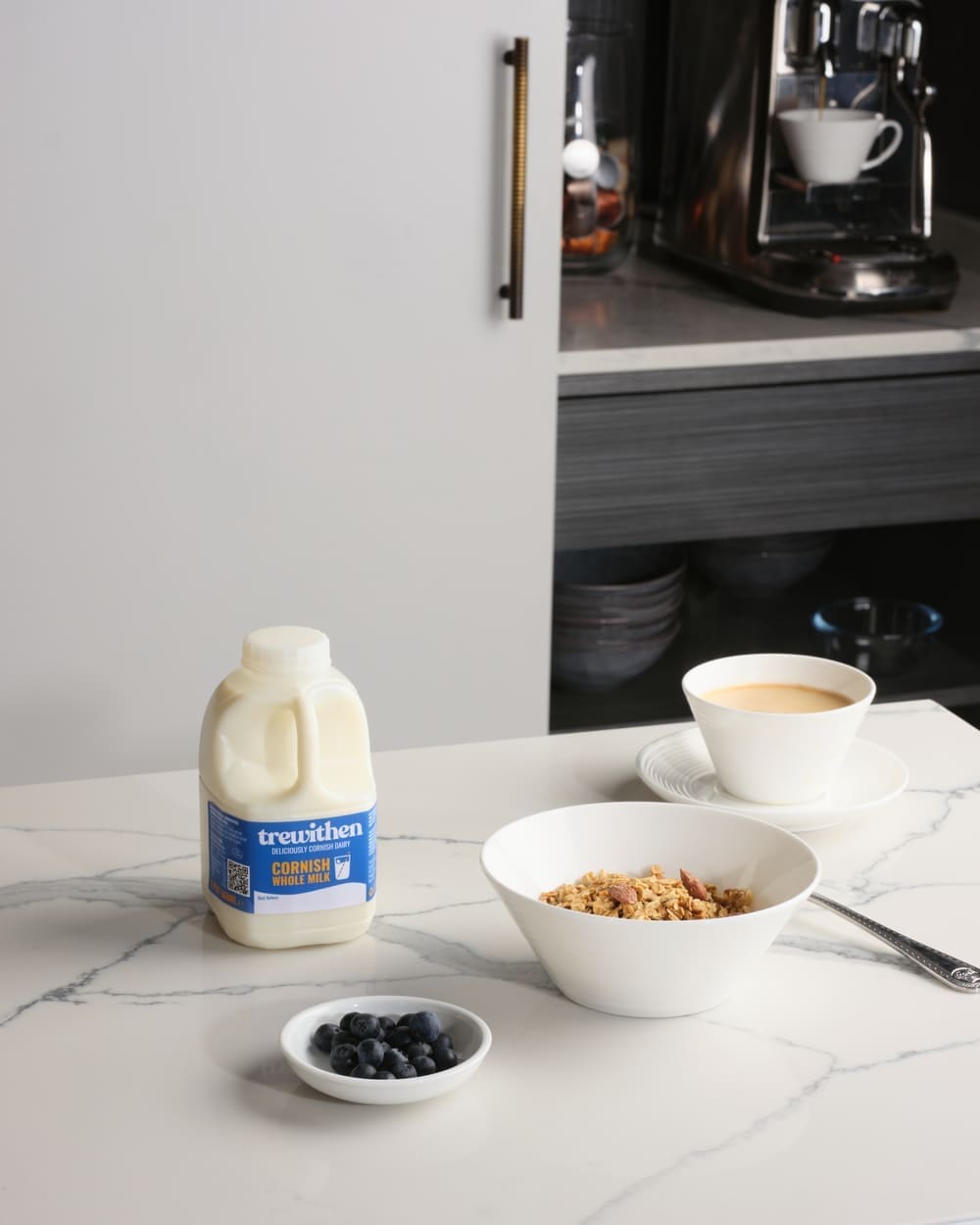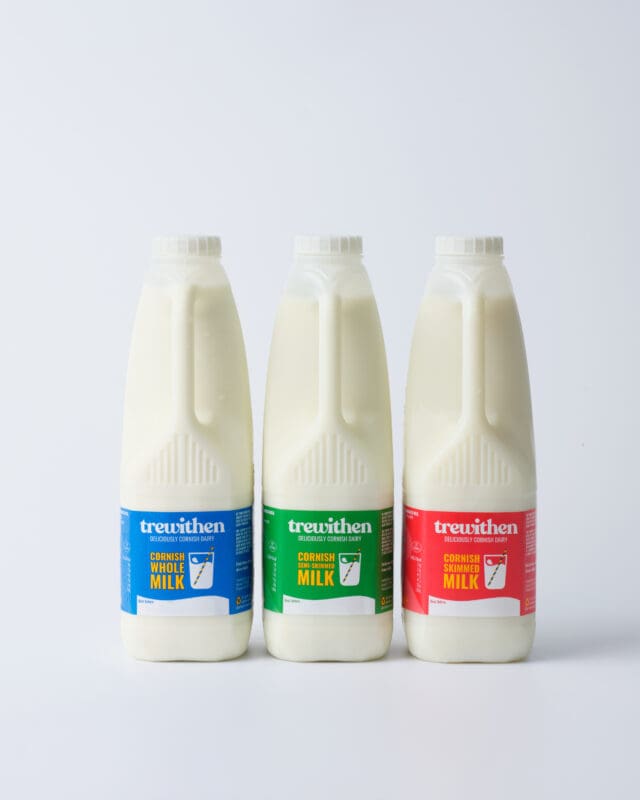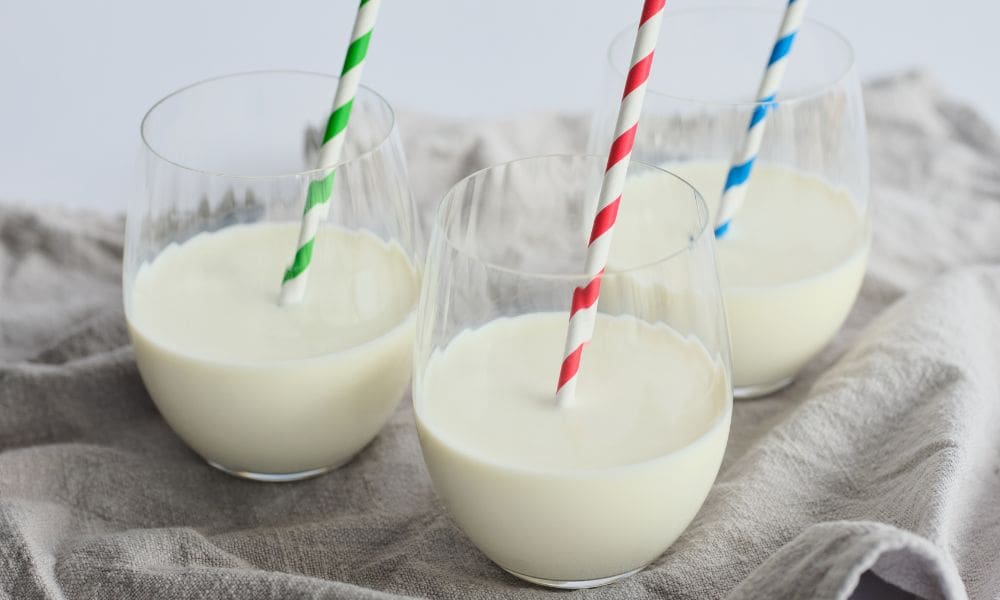Milk has been a part of our diets for centuries, cherished for its creamy taste and impressive nutritional profile. Whether you pour it into your morning cuppa, mix it into a smoothie, or enjoy it straight from the glass, milk remains a household favourite for good reason. In fact, the average person in the UK consumes as much as 70 litres a year. But is dairy milk good for you?
In this guide, we’ll reveal the many health benefits of milk and why it continues to be a nutritious choice for people of all ages. From its rich calcium content to its role in building strong bones, milk has earned its place as a classic staple.
The Basics of Dairy Milk: A Cornish Perspective
The Journey From Cow to Glass at Trewithen Dairy
Here at Trewithen Dairy, we know a thing or two about milk. We’ve been making delicious dairy products from the freshest Cornish milk for over 20 years. Our milk comes from a blend of Brown Swiss, Friesian, Holstein, and Jersey herds raised in Cornwall’s rugged coastal climate. We work with local farmers, all within 25 miles of our dairy, and we’re proud to know each one personally. Our milk is made with care, you get a taste of Cornwall in every sip, and it’s nutritious to boot.
Different Types of Milk We Produce
As well as irresistible yoghurts, golden Cornish butter, and indulgent clotted cream, we produce a whole range of milk packed with Cornish deliciousness, from whole and semi-skimmed to skimmed and barista. We now even offer Regen Milk – pure Cornish milk sourced from family farms embracing regenerative practices.
Let’s take a closer look at what makes milk so nutritious..
Understanding The Nutritional Composition of Milk
Protein, Fats, and Nutrients
Milk is more than just a deliciously creamy drink – it’s packed with nutrients your body loves. It’s a great source of calcium, protein, and vitamins like B12, B5, A and D. Plus, it contains healthy fats and carbohydrates.
Is Dairy Milk Good for You?
Whether in your coffee or on its own, milk truly is a nutritional all-rounder. But why is milk and dairy so good for you?
The Core Benefits
Essential Nutrients for Bone Health
Milk is a natural source of calcium and Vitamin D, which help keep your bones healthy and strong. It’s particularly important for growing children, teenagers, pregnant women, and women over 50. The recommended daily intake of calcium for adults is 700 mg a day. Milk contains around 248 mg per 200 ml portion, so a glass of delicious, cool milk can have as much as 33% of your daily calcium needs.
High-Quality Protein Content
Milk is also a fantastic source of protein – keeping our bodies strong and functioning properly. It helps build healthy bones, muscles and cells while also providing energy. Protein also has an important role in creating hormones and producing haemoglobin, which carries oxygen to our lungs and removes carbon dioxide.
In the UK, it’s recommended you get 0.75 g of protein for every kilo of body weight. That’s around 56 g for an average man and 45 g for the average woman. And they advise even more for women during pregnancy and breastfeeding.
Milk contains a chunky 3.5 g of protein per 100 ml, so in one 200-ml glass, you’ll find about 12.5% of a man’s recommended daily amount and 15.5% of a woman’s. Plus, it’s high-quality protein, packed with essential amino acids your body needs to stay healthy and strong.

Breaking Down Milk’s Nutritional Profile
Fat Content Explained
Milk contains varying levels of fat to suit different preferences in taste and texture and dietary needs, from whole milk’s creamy richness to calorie-cutting, low-fat options. Here at Trewithen Dairy, per 100 ml, our Whole Cornish Milk contains 3.6 g of fat, while lighter options like our semi-skimmed and skimmed contain 1.6 g and just 0.3 g, respectively.
The Role of Natural Milk Fats in Your Diet
Full-fat dairy products contain both healthy fats and saturated fats (the ones we need to watch out for). The good fats in milk provide essential fatty acids, help absorb vitamins, and add a satisfying taste and texture. Lighter choices like skimmed and semi-skimmed contain less fat without compromising the goodness of milk.
Protein Types in Milk
Milk contains two main types of protein: casein and whey. Casein makes up about 80% of the protein in milk, providing slow-digesting, sustained energy. Whey protein, the other 20%, is quickly absorbed and helps muscles repair and grow. Together, these proteins offer a balanced mix of nutrients, making milk a good choice for overall health and wellness.
Is dairy milk good for you? How Much Should You Drink Per Day?
UK Daily Recommendations
The NHS recommends we consume milk and dairy products as a source of protein and calcium, although there’s no official recommendation on daily intake. Some dieticians say we should aim for three portions of dairy a day which could be one glass of semi-skimmed milk or 150 g of yoghurt.
Making Dairy Part of Your Daily Diet
Creative Ways to Include Trewithen Milk in Your Diet
Getting dairy into your diet doesn’t simply mean a glass of milk or a pot of yoghurt, there are so many creative ways to add rich, creamy goodness to your daily dishes. Enjoy milk or yoghurt with low-sugar cereal for a satisfying breakfast, or cosy up with a warm milky drink before bed. And for a tasty morning pick-me-up, you could whip up a superfood smoothie with milk, fruits, seeds, and grains – the perfect way to start your day.
Here at Trewithen, we have a whole recipe section on our website dedicated to delicious dairy dishes. Some of our favourites include frosted flakes shake, chia jam and yoghurt pots, frozen yoghurt bark and crunchy homemade granola.
Balancing Dairy Intake With Other Foods
A healthy lifestyle is all about balance, so although dairy is a great addition to your diet, it’s always good to have a bit of variety. Green leafy vegetables are also good sources of calcium and oily fish can give you a Vitamin D boost, while meat and eggs are also packed with protein.
Tips for Those Watching Their Calorie Intake
If you’re trying to cut back on the calories, lower-fat dairy products are available, and most offer similar nutritional benefits.
Skimmed milk, for example, contains just 0.3 g of fat per 100 ml, while still boasting 130 mg of calcium, 3.5 g of protein and all the other nutrients of whole milk, such as vitamins D, B12, B6, A and C. For those who want a comparable taste and texture to whole milk, semi-skimmed can be the ideal middle ground with 1.6-1.8 g of fat per 100 ml and all the vitamin goodness.

Common Questions About Dairy Milk
Lactose Digestibility and Tolerance
Lactose is a natural sugar found in milk and all milk-containing dairy foods. While most people can digest it without issue, some may experience the discomfort of lactose intolerance. This happens when the body doesn’t produce enough lactase, the enzyme needed to break down lactose so it can pass through the body.
The Truth About Dairy Allergies vs Intolerances
Lactose intolerance is different from a dairy allergy. In the UK, around one in ten people are lactose intolerant, meaning they suffer from digestive discomfort and tummy troubles after consuming milk products.
A dairy allergy, on the other hand, is when a person has an allergic reaction to the protein in milk, causing anything from rashes to anaphylaxis. Dairy allergies are rare in older adults but affect 2-3% of babies and children.
Alternatives For Sensitive Tummies
If you’re lactose intolerant, you can buy lactose-free dairy milk. In these products, manufacturers add the lactase enzyme to remove lactose, while preserving the taste, texture and nutritional profile of milk. Lactose-free milk still contains milk proteins though, so they’re not suitable for those with a dairy allergy.
Pure Milk Goodness – The Trewithen Difference
When enjoyed as part of a healthy balanced diet, milk has clear nutritional benefits and there are some delicious ways to add it to your daily meals. At Trewithen Dairy, we take the finest Cornish milk and turn it into irresistibly delicious dairy products, from fresh Cornish milk to creamy natural yoghurt.
You’ll find our milky goodness in Tesco stores, Ocado and South West Spar. And if you’re a wholesaler looking to add a touch of Cornwall to your product range, get in touch with us today.
FAQs
Is it OK to drink dairy milk every day?
Yes, drinking dairy milk every day is fine for most people. It can be a great source of essential nutrients like calcium, protein and vitamins.
What does dairy milk do to your body?
Dairy milk helps keep your bones strong, supports muscle growth, and keeps your body functioning well, giving you the nutrients you need to feel strong and energised.
Can too much dairy be bad for you?
While milk is nutritious, consuming too much dairy can lead to excess calories, so it’s best to enjoy it in moderation as part of a balanced diet.
